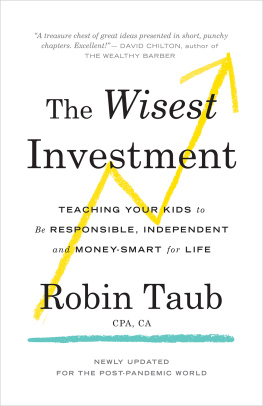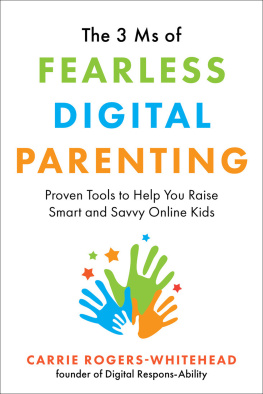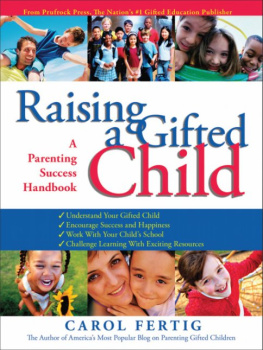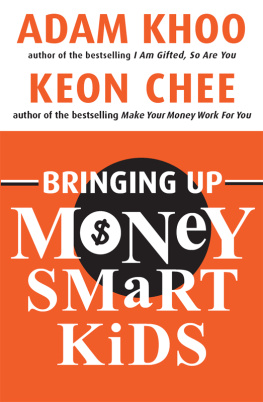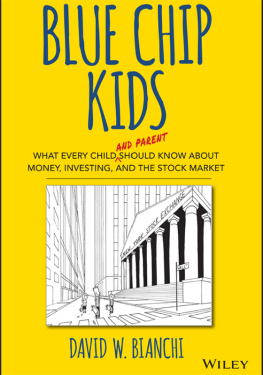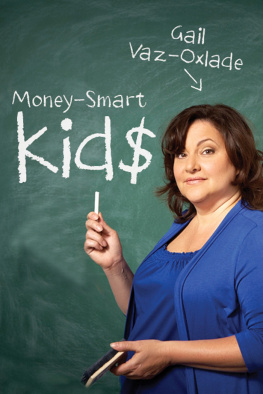Introduction
Like most parents, you feel a responsibility to teach your kids about money. You understand the importance of making sound financial decisions and developing good financial habits. You know how financial struggles can strain relationships and even take a toll on your health. But teaching kids about money is easier said than done, especially in todays financially complex, digital world where the tools we use are constantly changing to keep pace.
At a time when cash is disappearing, spending is frictionless, and fraud and scams are constant threats, seemingly out of nowhere, COVID-19 hit. Its sudden and devastating impact on the economy accelerated and magnified these trends. Many families found themselves financially unprepared, and the pandemic served as a wake-up call about the importance of teaching the next generation about money.
According to research, most parents feel they dont have the information they need to teach the right lessons about money, and they dont know how to approach the subject with kids of different ages. But they do recognize they need help, and they are willing to listen and learn.
As a Chartered Professional Accountant, Ive always felt comfortable and confident around money and financial concepts. And I believe money management is an important life skill, one that I wanted to pass on to my two kids. So in 2011, when I was asked to write a book to help parents teach their kids about money, I was intrigued. I had just started writing for the Ontario Securities Commissions financial literacy website, getsmarteraboutmoney.ca. But writing a book? It wasnt something I had ever really thought about doing. It certainly wasnt on my bucket list (like meeting Bruce Springsteen, which I managed to do in 2007!).
When Justin and Natalie were young, I started to invest in their financial education. I knew that the earlier kids are taught about money, the greater the likelihood of financial success throughout their lives. I tried to put my money where my mouth was and be a good financial role model to them. I took advantage of teachable moments to build money lessons into our daily lives, and I made sure that the information I shared with them (about earning, saving, spending, sharing and investing) was appropriate for their age and maturity (and I still do). Back in 2011, when my kids were 14 and 16, I could already see my efforts were paying off.
After some reflection, I thought to myself, Maybe I do have a book in me! Why not write about my own experiences both rewarding and challenging and the experiences of other parents? That, combined with solid research, would help parents like you give your kids the knowledge, skills and confidence that I gave my own kids.
I wrote A Parents Guide to Raising Money-Smart Kids, and it quickly became a Canadian bestseller. In the decade since it was first published, society has moved away from cash toward mobile and digital money and the economic consequences of the coronavirus pandemic have only accelerated this move. This third, updated version builds on time-tested lessons that have always applied and still apply today, while modifying some for the post-pandemic new normal. It also addresses both the challenges and benefits of managing money in an increasingly digital world. Over the same decade, my kids have grown into financially literate, independent and responsible young adults (most of the time!).
For anyone who may be thinking, How can I teach my kids about money if Im not doing a good job of it myself?, this book will make you more aware of your own behaviour around money and the type of financial role model you are to your kids now (and the type of role model you can become). But its something you and your kids can learn together, and it may even lead to improvements in your own financial habits and health as you become more skilled in understanding, practising and explaining money management.
To get the most out of your reading, you should understand a few things about how Ive organized the book. The first chapter sets the stage, explaining why teaching your kids about money is the wisest investment. It also covers what that implies about your own responsibility to be smart with your money so that you can teach by example.
But beyond your own example, there is the very basic need to talk to your kids about money. How do you approach it? Well, there are five pillars of money that can be used to structure an ongoing conversation. Chapter 1 explains the fact that in order to have money you have to earn it. Then, once youve earned it, there are just four things to do with it:
Chapters 2 through 5 are directed at parents with kids at different stages:
- young children (ages 58)
- preteens (ages 912)
- teens (ages 1317)
- emerging adults (ages 1821)
Each chapter is organized around the five pillars of money just discussed earn, save, spend, share, and invest and explores specific topics within each. There are suggestions for family discussions and activities designed to reinforce these concepts. Each chapter also contains quotes from parents talking about how they approached financial education with their kids, which remind us that we can find humour in even the most serious of subjects.
I hope the suggestions in this book and the real-life experiences of other parents will help you make the wisest investment. I would love to hear from you. Please email me at wisestinvestment@robintaub.com.
Robin
Chapter 1
The Wisest Investment
Teaching Your Kids about Money
This first chapter explains why teaching your kids about money is the wisest investment and helps you understand the context in which kids learn about money. It discusses some of the problem areas that parents run into and suggests approaches to deal with those problems effectively. This chapter also introduces the Eleven Healthy Habits of Financial Management, which can help you achieve two objectives: getting your own finances in order and teaching your kids how to do the same.
Why Is Teaching Your Kids about Money the Wisest Investment?
We want our kids to thrive in life. We want them to be able to manage their lives well, including their financial lives, for their sakes as well as our own. If we dont succeed in teaching our kids about money management, it may come back to haunt us. How would you feel, for instance, if you had to support your adult children financially? (Most Canadians cant afford to.) Or if you had to bail them out of a financial mess, like bankruptcy or an expensive divorce, with savings painstakingly accumulated and set aside for your own future? What if this happened when you were supposed to be enjoying your carefree retirement years? Its not a pretty picture, is it?
Those are some of the potential consequences for us as parents, but what about the kids themselves? If youve ever struggled with financial problems that were brought on by bad habits or simply by not knowing how to approach financial management effectively and efficiently then you know what a negative impact such problems can have on your life generally, and especially on your relationships with the people closest to you. Money stress can even be bad for your health and is a common cause of anxiety and depression. Its certainly worth investing in our children to spare them from such struggles.

